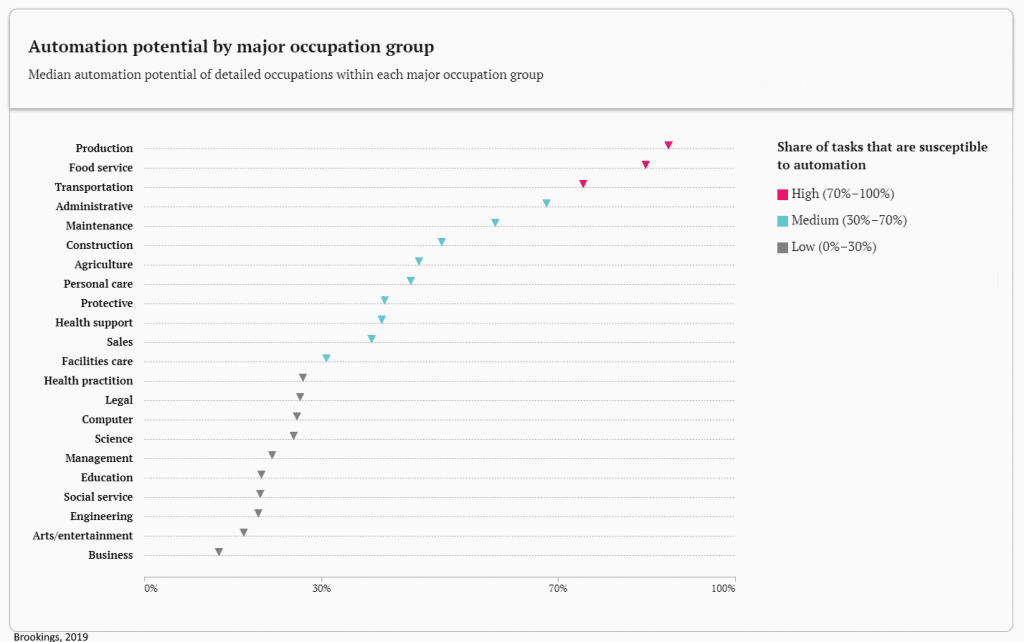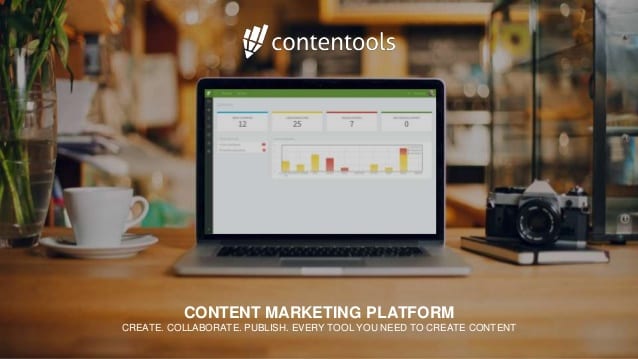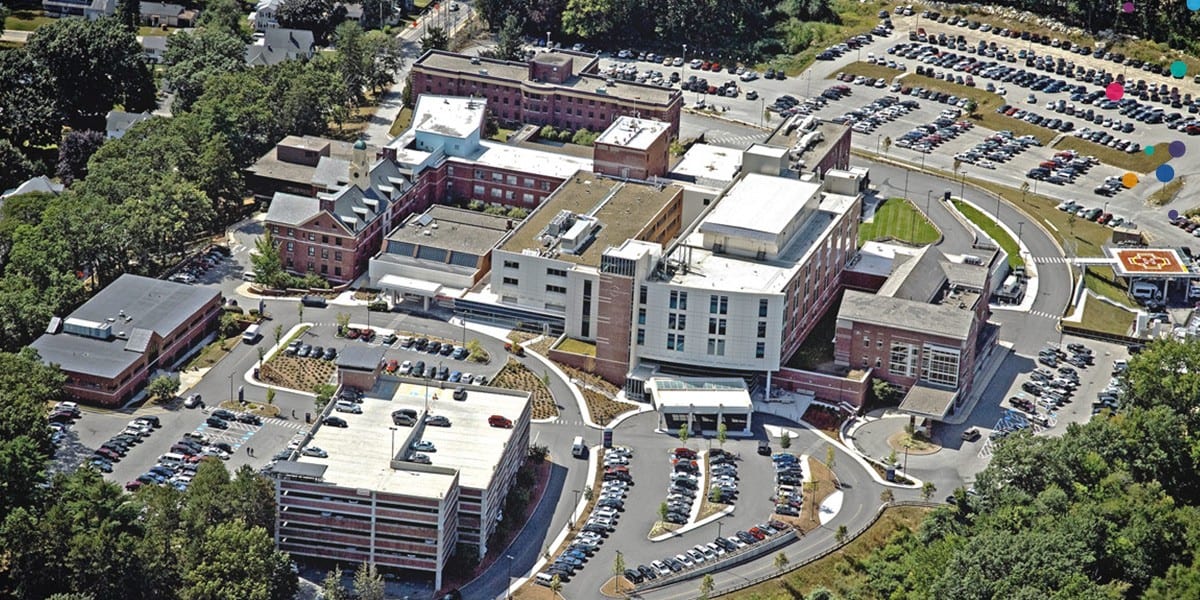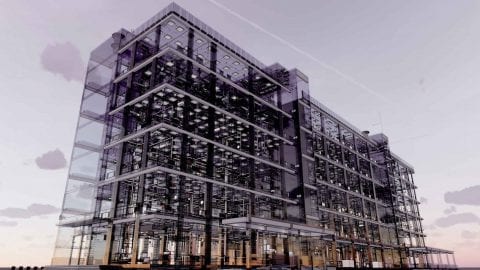Is AI Destroying Jobs or Creating new ones? In this article, we explore what is happening. Innovations using AI-driven automation models can render jobs obsolete, but also it may be ushering in the collaboration of humans and artificial intelligence.
Introduction
Over the past years, artificial intelligence has matured from Minsky’s neural agents into powerful deep learning models that deliver a competitive advantage to businesses. Current global AI adoption and investment are soaring, topping over US$97 billion by 2023, with the US and China leading the way. Two recent studies show how the impact of artificial intelligence on workers may affect workers’ jobs and what companies are doing to prepare for this new world. In one of the studies, a third of all jobs in Britain are to be automated, changing the employment market dramatically over the next 20 years. On the other hand, new jobs will be available based on AI and machine learning. The second study presents a more detailed analysis of the impact of automation on jobs, which deals with the possible impact of automation on workers in economic sectors and shows how this could change the distribution of jobs across the various economic sectors. Sources: 0, 5, 10, 14
To see how the total number of jobs will change in the near future, we look at how AI will create other jobs that need to be filled, but it could lead to lost jobs through automation. Sources: 8, 16
Most studies believe that while AI could threaten unskilled jobs through automation, it could also create jobs that require new skills developed through training. Potential job impacts of AI include new jobs requiring new AI-related skills, as well as new types of jobs. Sources: 8
While workers want to transform their careers and invest in skills that can increasingly be done by automation and artificial intelligence, this research highlights the need for workers with these skills and skills that are increasingly replacing people in these occupations with automation and artificial intelligence. Sources: 2

The impact of AI on the future of work is usually portrayed as AI automation of tasks, not jobs, and the workers who deliver tasks that machines can not do will benefit more from automation than the workers who do tasks that machines can do. Increasing the number of workers with the skills needed for AI and other forms of automation could improve predictions of automation and AI, further solve labor trends, and further satisfy labor needs. Sources: 4, 9, 17
Some workers fear that artificial intelligence will replace their work or that humans will no longer play a role in the assembly line. Despite these concerns, we firmly believe that AI has the potential to change the workplace positively. One in four workers believes that AI, automation, and other technologies will change their work for the better and cite the benefits of productivity and problem-solving as their top priority. Three quarters agree that AI technology is already enabling employees to make better decisions. Humans and workers, and AI are empowering each other to encourage new ways of working. Sources: 1, 14, 18
In short, fears that AI and other forms of automation will take jobs away from everyone are unfounded. The danger that robots replace product managers is that AI or automation simply cannot do what they do. It would be unreasonable to say that artificial intelligence will not replace jobs but will make them more accessible and better for people. Sources: 7, 15, 16
Organizations that use machines merely to displace workers through automation will miss out on the full potential of AI. The lesson is clear: most new jobs in the future, whatever they are, will be created by automation, and they will not be the same areas as those that they disrupt. Sources: 14, 16
Like many new technologies that exist, many AI tools will help workers automate tasks and jobs rather than replace them. The integration of AI into the workplace will take the form of machine learning, artificial intelligence (AI), and artificial neural networks. Sources: 11, 16
We are only seeing the beginning of automation in the workplace, but more tasks will be available for automation as technology increases. There are two types of job-creating robots: AI-embedded co-bots (robots that can work shoulder to shoulder with factory workers) and robots that can create new jobs while eliminating old ones. The particular reason to expect these and other types of technological change will lead to a significant overall loss of jobs because they can be disruptive and destroy jobs for workers. They help workers perform tasks in a safe environment and create new employment opportunities for themselves and their families. Sources: 6, 12, 18
Well-educated workers with the skills needed to adopt automation and AI technologies will ensure that economies enjoy stronger productivity growth. McKinsey estimates that automation will replace only 15% of the world’s workforce by 2030, but most (14%) of the world’s workforce will have to move to another occupation, while 60% of jobs will be automation-prone. In some cases, artificial intelligence – automation – can eradicate jobs, like US agricultural workers falling from 40% in 1900 to 2% today. Even under this trend scenario, Germany will have no choice but to employ all its workers, and its labor force will shrink by three million by 2030. Sources: 0, 13, 16
Because of this, policies should encourage the introduction of all forms of technology that can lead to more jobs and higher wages, such as automation in education and training.
Note: This article was researched, written, and edited by AI. Talk to us if you are a hot startup or a fast-paced enterprise, and want to get introduced to our growth and innovation programs.
Cited Sources
- https://www.mckinsey.com/featured-insights/future-of-work/jobs-lost-jobs-gained-what-the-future-of-work-will-mean-for-jobs-skills-and-wages 0
- https://www2.deloitte.com/us/en/insights/focus/cognitive-technologies/ai-adoption-in-the-workforce.html 1
- https://www.frbatlanta.org/cweo/workforce-currents/2020/02/12/opportunity-occupations-and-the-future-of-work 2
- https://www.brookings.edu/blog/up-front/2019/03/18/robots-kill-jobs-but-they-create-jobs-too/ 3
- https://www.pnas.org/content/116/14/6531 4
- https://www.ncci.com/Articles/Pages/II_Insights_QEB_Impact-Automation-Employment-Q2-2017-Part1.aspx 5
- https://voxeu.org/article/how-computer-automation-affects-occupations 6
- https://blog.apruve.com/12-jobs-that-will-be-soon-replaced-by-ai 7
- https://www.cmswire.com/digital-workplace/why-artificial-intelligence-will-create-more-jobs-than-it-destroys/ 8
- https://www.brookings.edu/research/automation-and-artificial-intelligence-how-machines-affect-people-and-places/ 9
- https://www.roboticsbusinessreview.com/ai/new-research-shows-how-ai-will-impact-the-workforce/ 10
- https://towardsdatascience.com/artificial-intelligence-will-make-the-workplace-more-human-not-less-49af1ce6cd0d 11
- https://www.businessnewsdaily.com/9835-automation-tech-workforce.html 12
- https://tutorials.one/automation-and-the-workforce-of-the-future/ 13
- https://talentorganizationblog.accenture.com/financialservices/artificial-intelligence-in-the-workforce-news 14
- https://thenextweb.com/podium/2019/07/16/to-prepare-todays-workforce-for-ai-they-must-understand-its-not-a-threat/ 15
- https://www.skynettoday.com/editorials/ai-automation-job-loss 16
- https://m-cacm.acm.org/magazines/2020/4/243623-artificial-intelligence-and-the-future-of-professional-work/fulltext 17
- https://blog-idcuk.com/augmenting-or-substituting-how-the-workforce-should-tackle-the-fear-of-ai/ 18










